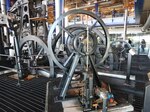Thinktank, Birmingham Science Museum
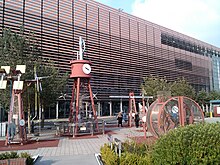 The Science Garden at Thinktank | |
 Location in West Midlands | |
| Established | 2001 |
|---|---|
| Location | Millennium Point, Birmingham, England |
| Coordinates | 52°28′58″N 1°53′10″W / 52.482908°N 1.886058°WCoordinates: 52°28′58″N 1°53′10″W / 52.482908°N 1.886058°W |
| Type | Science and industry |
| Visitors | 243,069 (2019)[1] |
| Website | www |
Thinktank, Birmingham (formerly known as simply Thinktank) is a science museum in Birmingham, England. Opened in 2001, it is part of Birmingham Museums Trust and is located within the Millennium Point complex on Curzon Street, Digbeth.
History[]
The Birmingham Collection of Science & Industry was started in the mid-19th century, initially consisting of collections of weapons from the gun trade and the Birmingham Proof House. The Birmingham Museum & Art Gallery opened in 1885, including science collections. In 1951 the Museum of Science and Industry opened at Elkington Silver Electroplating Works, Newhall Street. Over the following years, the museum acquired individual artefacts, as well as entire collections, that were related to local industry and the history of science and technology.[2]
Birmingham City Council decided in 1995 to relocate the museum[3] when it was given an opportunity by the Millennium Commission to construct a new building.[4] The former museum closed in 1997,[2] and Thinktank opened on 29 September 2001[5] as part of the £114-million Millennium Point complex.[5] It was funded by Birmingham City Council, supported by the Millennium Commission.[6] The area adjacent to the building is designated Eastside City Park.[7] While many objects were put on display at Thinktank, others were stored at the Birmingham Museum Collection Centre, and some were brought out of storage.[2]
Although the previous science museum was free to enter, Thinktank charges an entrance fee.[5] In 2005 the museum underwent a £2 million upgrade, including the installation of a planetarium.[8] By 2007 it had received over 1 million visitors.[6] In April 2012, Birmingham Museums Trust took over governance and management responsibility for Thinktank, along with eight other sites.[9]
In March 2015, a new "Spitfire gallery" opened, relating the displayed aircraft to their production, locally.[10] Among the new exhibits are a leather flying helmet previously belonging to Helen Kerly, one of only two British civilian women commended for flying during the Second World War.[11]
Collections[]
Aircraft[]
| Photo | Item | Description |
|---|---|---|
 |
Supermarine Spitfire Mark IXc | ML 427, built in 1944, gifted by the Air Ministry in 1958.[12] Suspended from ceiling.[13] It was one of around 10,000 Spitfires that were manufactured at Castle Bromwich.[14] |
 |
Hawker Hurricane Mark IV | Number KX829. Built in 1943 by Hawker Aircraft Ltd, later owned by Loughborough College of Technology and given to the museum in 1961.[15] Suspended from ceiling.[13] |
Locomotives[]
| Photo | Item | Description |
|---|---|---|
 |
46235 City of Birmingham[13] | A LMS Princess Coronation Class steam locomotive, built in 1939, and given by the British Railways Board to the museum upon withdrawal in 1966.[15] |
 |
William Murdock's model steam carriage | 1784 |
Trams[]
| Photo | Item | Description |
|---|---|---|
 |
Birmingham Corporation Tramways tram 395 | The only surviving Birmingham tram.[16] |
Cars[]
| Photo | Item | Description |
|---|---|---|
 |
Railton Mobil Special[13] | |
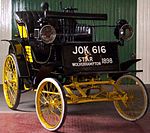 |
Mercedes Benz car[16] | Manufactured by Star Motor Company, Wolverhampton, in 1898, given to the museum in 1965.[17] |
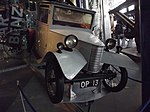 |
Lanchester petrol-electric car | Designed and manufactured by Frederick William Lanchester in 1926. Given to the museum in 1961.[15] |
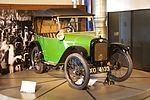 |
Austin 7 | Austin 7 Tourer car, Registration number XO 4133. Built in 1923, owned by the factory until 1944 before passing to private ownership, given to the museum in 1975.[16][18] It is the ninth oldest example of the ~300 remaining.[14] |
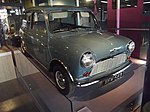 |
Morris Mini-Minor | Registration number XEW 583, built in 1959, purchased by the museum in 1982.[16][17] |
Stationary steam engines[]
Thinktank, Birmingham Science Museum has a big collection of stationary steam engines. The following are some examples of them:
| Photo | Item | Description |
|---|---|---|
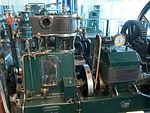 |
Dating from 1891, designed by and , given by in 1982.[19] | |
| Dating from 1873, designed by Eugen Langen and Nicolaus August Otto, given by T A W Clarke Ltd in 1976.[19] | ||
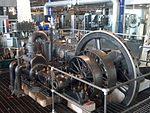 |
Dating from 1924, designed by Johann Stumpf, given by in 1956.[19] | |
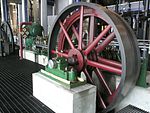 |
Corliss Mill engine | A horizontal tandem compound steam, with Corliss valve gear. Made by Pollitt & Wigzell of Sowerby Bridge, West Yorkshire, England. Formerly at the University of Manchester.[20] |
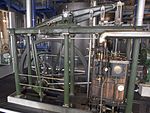 |
pumping engine | Used from 1894 until the mid-1950s, at the Old Kent Road Gas Works, London, for pumping coal gas. |
| Murray's Hypocycloidal Engine | Made around 1802,[21] third-oldest working engine in the world.[16] Given by N. Hingley & Sons Ltd in 1961.[21] | |
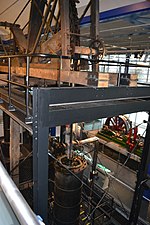 |
Smethwick Engine | The oldest working engine in the world,[13] designed and built by James Watt in 1779, and in use until 1891. The engine was donated by Birmingham Canal Company to the museum in 1959. It was awarded a heritage award plaque by the Institution of Mechanical Engineers in 2014. It is run on steam power for several days each year, and its water lifting feature is demonstrated daily.[22] |
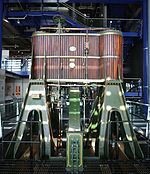 |
Built in 1883, manufactured by James Watt & Co, Birmingham, given in 1958.[19] Named for Albert Rollit, Mayor of Hull. |
Other machines[]
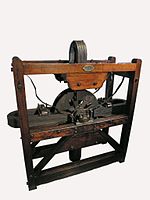 |
Woolrich generator | The world's first heavy electrical machine[16] |
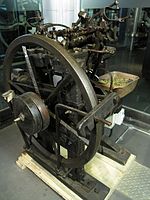 |
making machine | One of the earliest machines that was designed to manufacture a specific product.[16] Designed by Ralph Heaton in 1794, powered by steam, and made nearly 750,000 button shanks a day back in 1851.[14] |
Displays[]
Thinktank has four floors of over 200 hands-on exhibits and artefacts. Each floor has a theme, in general going from the past, in The Past (Level 0), through The Balcony (Level 1) and The Present (Level 2), to the future, in The Future gallery (Level 3).[23] It has lost its theme as new items have been added.
| Photo | Level | Gallery | Description |
|---|---|---|---|
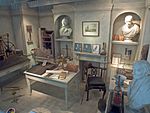
|
0: The past | Boulton and Watt [CLOSED] | Display of objects relating to James Watt, Matthew Boulton, William Murdoch and associates, including other members of the Lunar Society. This area has since been removed. |
| 0: The past | Move It | Vehicles that were built in, or used around, the Birmingham area, including bikes, cars, trams, trains and planes.[13] The gallery includes a pair of robots that display how a car is spot-welded during construction.[citation needed] | |
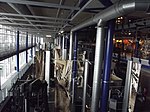
|
0: The past | Power Up | The museum's steam engine collection.[13] There is a display further on in the exhibition explaining the history of Boulton and Watt, and how they developed their engines. Other steam engines in this exhibition are those that have been used for pumping sewage, generating electricity, agricultural work and teaching. There is also a display explaining how power is currently generated by a steam turbine.[citation needed] |
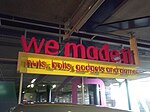
|
1: The balcony | We made it | This gallery contains over 20 interactive exhibits and 1200 objects showing the history of Birmingham as "the workshop of the world", covering the production of everyday goods from raw materials to finished product. It is split into four sections: "Nuts and Bolts" on iron and steel goods, "Treasure" on precious metals and gemstones, "Tins and Things" on aluminium and decorative glass goods, and "Gadgets" on modern devices made of plastic and wood.[24] |
| 1: The balcony | Spitfire Gallery [CLOSED] | A new gallery focused on the Spitfire is now open.[25] It features a history of the Spitfire and its manufacture at Castle Bromwich, artefacts such as engine parts and flight suits, as well as hands-on exhibits including a model of a Rolls-Royce Merlin engine, designed by Arthur John Rowledge (1876-1957). Unfortunately, due to its weight of over 900 kg, the museum's Griffon engine, fitted to later Spitfire versions, could not be put on display[26] This has been closed also. | |

|
2: The Present | Things About Me | This exhibition is aimed at younger children, helping them to understand how their own body works, and how to keep it working. It is a bright and noisy gallery. There are small characters called TAMs (after the gallery name), who act as guides throughout the museum.[27] |
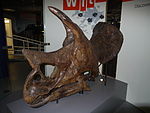
|
2: The Present | Wild Life | This is a living history gallery containing insects, birds and mammals, as well as fossils.[27] Taxidermied animals include a polar bear,[28] a great auk and a pair of huia.[29] Skeletons include a giant deer.[30] Fossils include a Triceratops skull.[31] |

|
2: The Present | The Street | The Street is designed to show visitors how science affects their everyday life, and how objects they see around them work.[27] There is a Recycling Plant, which may close down as it has a few problems with the electronics. |

|
2: The Present | Kids' City [CLOSED] | Kids' City is an exhibition that has been designed for small children, aged 7 and younger. It is more of a play area than a traditional exhibition but also contains a garden with water feature, a health centre, café, as well as an animation studio featuring Shaun the Sheep.[27] Because of the new revamp, Minibrum, the kids city has unfortunately shut down. |
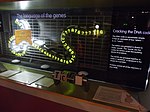
|
2: The Present | Medicine Matters | Medicine Matters is an exhibition that contains displays on modern medicine and medical breakthroughs,[27] including current medical practices and the moral dilemmas that occur, while other exhibits cover DNA, epilepsy, genetics, vaccination and personal health.[citation needed] |

|
3: The Future | Futures | The Futures gallery deals with the impact of science, technology and medicine, both at present and in the future.[32] The interactive gallery includes display screens, controlled with trackballs and buttons, with a "Futures" unit surrounding the space and a "Space Mapper" unit in the middle.[33] There is also a "Talking Point" area about future projections by scientists, as well as "Create an Alien" and "RoboThespian" exhibits, which lets you program the robot to do whatever you want![32] |
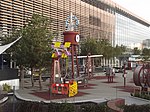
|
Outdoor | Science Garden | The Science Garden is an interactive outdoor space with over 30 exhibits. It also includes an outdoor classroom for shows and school workshops. It is located in front of Thinktank, and forms part of the Eastside City Park.[7] |

|
3: --- | Planetarium | Thinktank Planetarium opened on 17 December 2005. It was Birmingham's first planetarium,[6] and the UK's first purpose-built digital planetarium.[14] Its opening coincided with the closure of the London Planetarium.[6] It has 70 seats, and the projection dome is 10 metres (33 ft) in diameter.[8] The main operating system is Digistar 3. Six 1400×1050 DLP projectors, each connected to a PC, work together to produce a hemispherical image 3200×3200 pixels in size.[citation needed] In its first year it received 60,000 visitors,[6] and in August 2014 it received 17,000 visitors.[34]
It is used to display stars as they would appear from on Earth at any point in time, and to simulate travel to the stars.[8] On 4 August 2014 it was used to project the night sky as it would have appeared on 3 August 1914, as part of a World War I memorial event.[35] Aside from projecting stars, digital planetariums can fill the dome with 360˚ of sound and video, and are therefore also known as immersive cinemas or 'fulldome' theatres.[citation needed] The planetarium displays films about space and the night sky, the human body and undersea exploration, as well as music and light shows.[34][36] In September 2014 it was used to provide a live link with Tim Peake at a European Space Agency training camp as part of a conference.[34] The Planetarium can be noticed if you look closely in the Minibrum Area. |
Surroundings[]
The museum shares the Millennium Point building with Birmingham City University, and is situated in the Eastside district. It lies near Aston University and the Gun Quarter – which was for many years the centre of world's gun-manufacturing industry. Immediately opposite are The Woodman, a public house, and Curzon Street railway station - both listed buildings.
References[]
- ^ "ALVA - Association of Leading Visitor Attractions". www.alva.org.uk. Retrieved 9 November 2020.
- ^ Jump up to: a b c "Our Collection". Birmingham Stories. Archived from the original on 12 February 2015. Retrieved 7 March 2015.
- ^ "Archive of our city's great past". Birmingham Evening Mail. 24 May 2001. Archived from the original on 29 March 2015. Retrieved 20 February 2015 – via HighBeam Research.
- ^ "Future Looks Bright for Millennium Museum". The Birmingham Post. 4 February 1998.[dead link]
- ^ Jump up to: a b c "Think Tank for the millennium". BBC News. 7 September 2001. Retrieved 5 March 2015.
- ^ Jump up to: a b c d e Great Britain: Parliament: House of Commons: Science and Technology Committee (22 October 2007). The funding of science and discovery centres: eleventh report of session 2006-07, Vol. 2: Oral and written evidence. The Stationery Office. pp. 134–135. ISBN 978-0-215-03662-9. Retrieved 5 March 2015.
- ^ Jump up to: a b "Science Garden". Thinktank. Retrieved 7 March 2015.
- ^ Jump up to: a b c "State Of The Art Planetarium Opens At Birmingham's Thinktank". Culture24. 16 December 2005. Retrieved 5 March 2015.
- ^ "West Mids accountants appointed by largest independent museums trust". Commercial News Media. 22 July 2013. Retrieved 5 March 2015.
- ^ Young, Graham (26 March 2015). "First look at Birmingham's new Spitfire Gallery at Thinktank - Birmingham Post". Retrieved 27 March 2015.
- ^ Cole, Paul. "Mystery of the Spitfire Heroine". Birmingham Evening Post.
- ^ "Transport (set 4)". Birmingham Stories. Archived from the original on 2 April 2015. Retrieved 7 March 2015.
- ^ Jump up to: a b c d e f g "Discover the Past". Thinktank. Retrieved 7 March 2015.
- ^ Jump up to: a b c d "11 amazing things the Thinktank can teach you about science in Birmingham". Birmingham Mail. 20 March 2014. Retrieved 7 March 2015.
- ^ Jump up to: a b c "Transport (set 2)". Birmingham Stories. Archived from the original on 2 April 2015. Retrieved 7 March 2015.
- ^ Jump up to: a b c d e f g "Thinktank Birmingham Science Museum". Automuseums. Retrieved 7 March 2015.
- ^ Jump up to: a b "Transport (set 3)". Birmingham Stories. Archived from the original on 2 April 2015. Retrieved 7 March 2015.
- ^ "Transport (set 1)". Birmingham Stories. Archived from the original on 2 April 2015. Retrieved 7 March 2015.
- ^ Jump up to: a b c d "Engines (set 1)". Birmingham Stories. Archived from the original on 2 April 2015. Retrieved 7 March 2015.
- ^ Birmingham Museums Trust accession record 1955S00557
- ^ Jump up to: a b "Engines (set 2)". Birmingham Stories. Archived from the original on 2 April 2015. Retrieved 7 March 2015.
- ^ "World's oldest working steam engine is Birmingham Museums Trust's Object of the Month for March". Birmingham Post. 3 March 2015. Retrieved 7 March 2015.
- ^ Thinktank What's On Leaflet, 2013
- ^ "We Made It". Thinktank. Retrieved 7 March 2015.
- ^ "Spitfire exhibition to open at Birmingham's Thinktank". Birmingham Post. 22 November 2014. Retrieved 7 March 2015.
- ^ "Chocks away for Spitfire exhibition at Birmingham's Thinktank Museum". Birmingham Mail. 6 February 2014. Retrieved 7 March 2015.
- ^ Jump up to: a b c d e "Investigate the Present". Thinktank. Retrieved 7 March 2015.
- ^ Birmingham Museums Trust accession catalogue. Accession number: 1959Z00458
- ^ Birmingham Museums Trust accession catalogue. Accession number: 1973Z00048
- ^ Birmingham Museums Trust accession catalogue. Accession number: 2001Z00065
- ^ Birmingham Museums Trust accession catalogue. Accession number: 1958G00003.00001
- ^ Jump up to: a b "Find the Future". Thinktank. Retrieved 7 March 2015.
- ^ "Paul Maguire • biography • projects • thoughts • information". Retrieved 19 January 2015.
- ^ Jump up to: a b c Elkes, Neil (5 September 2014). "Live link up with British astronaut at Birmingham science event". Birmingham Mail. Retrieved 5 March 2015.
- ^ "Remember to take part in the WW1 memorial event Lights Out today". The Mirror. 4 August 2014. Retrieved 5 March 2015.
- ^ "Planetarium". Thinktank. Retrieved 5 March 2015.
External links[]
| Wikimedia Commons has media related to Thinktank, Birmingham. |
- Museums in Birmingham, West Midlands
- Planetaria in the United Kingdom
- Railway museums in England
- Industry museums in England
- Steam museums in England
- Local museums in the West Midlands (county)
- Transport museums in England
- Technology museums in the United Kingdom
- Science museums in England
- Industry in Birmingham, West Midlands
- Birmingham Museums Trust

